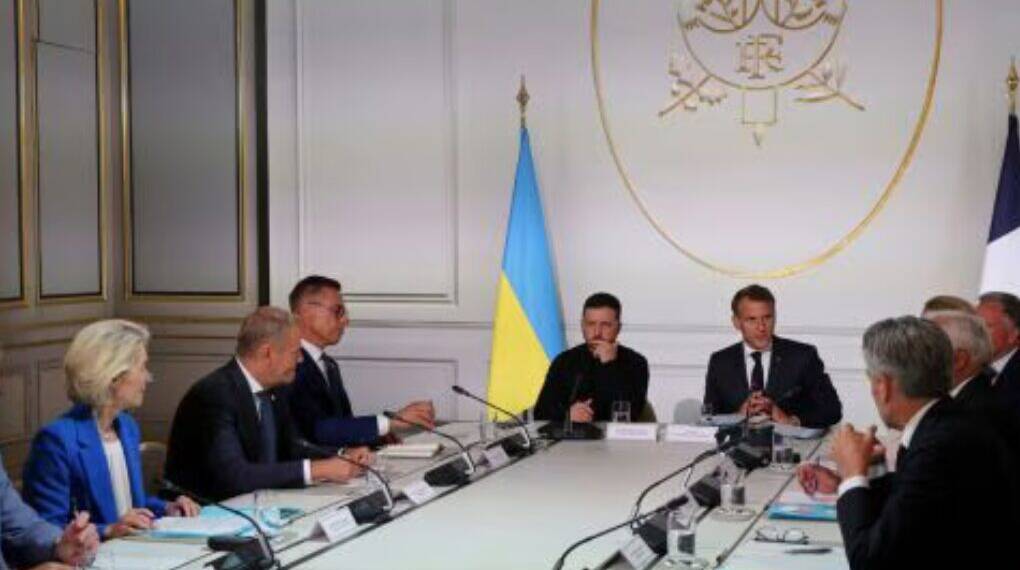In one of the most significant diplomatic steps since Russia launched its full-scale invasion of Ukraine in 2022, French President Emmanuel Macron announced that 26 nations have pledged to provide postwar security guarantees for Ukraine.
The plan includes the deployment of an international force on land, at sea, and in the air, aimed at ensuring Ukraine’s stability, rebuilding its defenses, and deterring future Russian aggression.
The announcement followed a high-level summit at the Élysée Palace in Paris, attended by 35 leaders from the so-called “coalition of the willing.” The gathering was meant to finalize the security framework and secure U.S. support, which European leaders view as vital for its viability.
Macron: “Guarantees Will Be Deployed the Day the Conflict Stops”
Speaking alongside Ukrainian President Volodymyr Zelensky, Macron stressed that these guarantees are not theoretical pledges but will be put into action the moment hostilities cease. “The day the conflict stops, the security guarantees will be deployed,” he said.
He explained that the commitments range from direct troop deployments to support roles such as training Ukrainian forces, supplying equipment, and monitoring a ceasefire. “The key argument here is that there are no limitations for the defense of Ukraine,” Macron added, noting that Kyiv’s armed forces need to be “regenerated” to resist Russia and to dissuade Moscow from attempting another invasion.
France and Britain, co-chairs of the coalition, have expressed readiness to deploy troops in Ukraine once the war ends. Other states are more cautious. Germany has promised support but said its participation in a military role will depend on the scale of U.S. involvement. Italy, meanwhile, ruled out sending soldiers to Ukraine but offered to host training missions and oversee ceasefire compliance outside Ukrainian territory.
U.S. Involvement Still Under Negotiation
Macron confirmed that he and other European leaders, along with Zelensky, held a joint call with U.S. President Donald Trump during the summit. Although Washington’s specific contributions are not yet finalized, Trump reportedly pledged support and promised to join in taking action if Russia refuses to respect a future peace arrangement.
A White House official later said Trump urged European nations to stop importing Russian oil and called for stronger economic pressure on China, which he accused of indirectly financing Moscow’s war efforts.
European officials have long argued that without American participation, security guarantees for Ukraine would lack credibility. For that reason, they are pushing for a concrete U.S. commitment before the framework is formally activated.
Zelensky: “Concrete Steps Are Agreed”
For Ukraine, the agreement represents a vital assurance of continued support. Zelensky welcomed the pledges, saying that the framework already includes “concrete steps” and that leaders are now determining which countries will take on which responsibilities.
“Our intention is clear — to finish this war as soon as possible and move toward peace,” Zelensky said. “But peace must come with guarantees. The key to ending the war is depriving the Russian war machine of resources. That means more sanctions, more pressure on Moscow.”
Peace Talks Remain Distant
Despite the ambitious pledges, European leaders acknowledged that the prospect of negotiations remains slim. Macron accused Moscow of deliberately delaying peace efforts, saying Russia continues to escalate attacks with the backing of certain global partners.
He proposed a phased approach, beginning with direct talks between Zelensky and Russian President Vladimir Putin, followed by wider discussions with international mediators. However, he admitted that if Moscow refuses to engage, Ukraine’s allies will need to “take further steps with the U.S.”
Europe’s Strategic Gamble
The initiative is Europe’s boldest attempt yet to secure Ukraine’s long-term survival. It reflects a recognition that Kyiv cannot be left exposed once the war ends. By committing to a multinational security presence, European states are signaling both to Ukraine and to Moscow that Ukraine’s independence will be defended beyond the battlefield.
“This is not just about Ukraine,” Macron concluded. “It is about the security of all of us. We cannot allow international law to be violated without consequences.”
For now, the guarantees remain conditional on the war’s end. But with 26 nations ready to commit, backed by the prospect of U.S. involvement, the message from Paris is clear: Ukraine will not stand alone when the guns fall silent.








